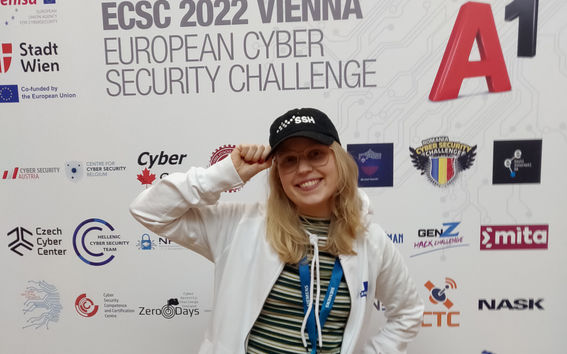Meeting Linda Liukas encouraged Leila Arstila to switch to computer science - now she represented Finland in a cybersecurity competition in Austria

Leila Arstila, a Master's student at the Department of Computer Science, took part in the European Cyber Security Challenge (ECSC) in Austria 13-16 September. ECSC is an initiative by the European Union Agency for Cybersecurity (ENISA) and aims at enhancing cybersecurity talent across Europe. Finland participated for the first time and finished 12th. A total of 27 European plus five visiting countries participated in the competition.
The competition tasks were divided into two parts. The first part consisted of various tasks including cryptography, vulnerable websites and software, and open-source intelligence.
‘My teammate and I managed to solve an escape room type task, which only the Austrian team solved, apart from us. It was a postcard with a picture of Google's office and an imaginary person working at Google. That started a series of tips on diverse social media platforms, where we had to find relevant tips and at the same time distinguish those from false ones,’ says Arstila.
The idea was also to highlight the dangers of sharing pictures on social media, for example of a key card or a computer screen with email open.
‘People and companies share a huge amount of information about themselves on social media. By putting together smaller parts of information, you can unravel the bigger picture. I find detective work interesting,’ says Arstila.
After the static tasks came the attack and defense part of the challenge, where teams actively competed against each other. Each team had a similar server that contained vulnerable services. The task was to attack the other teams' servers and at the same time try to fix the weak services on their own computers.
‘This task was more difficult. If you could find and use a juicy attack, another team might be able to copy it from the event logs,’ explains Arstila.

Less than a tenth of the competitors were young women.
‘The information security sector is still very homogeneous and therefore I felt a lot of stress prior to the competition. Fortunately, corrective actions are already being taken. Prior to the actual competition for instance, a weekend was organised for 20 female competitors alone. The atmosphere there was good and gentle,’ says Leila Arstila.
From stereotypes to finding a role model
Because environmental issues are important to Leila Arstila, she travelled to the competition by boat, train and bus. The journey took 28 hours each way. Her journey to computers and coding also took long.
‘I became more familiar with the world of computers and coding in the upper secondary school. But I thought I couldn't be a coder or a computer science student because I was a young woman. Stereotypically, being a coder is associated with soda and pizza, a hoodie and coding even in your sleep, and that is not who I am,’ says Arstila.

For Leila Arstila, the moment she met coder, author and speaker Linda Liukas in 2018 was significant.
‘Linda Liukas is exactly the kind of person I am. She has played a big role in my thought process towards creating my own professional identity. Therefore, it wasn't until I had studied chemical engineering at Aalto University for a few years that I realised I didn't need to fit into any stereotypes. Creativity and the ability to invent solutions are enough,’ says Arstila.
In the European Cyber Security Challenge, Finland was represented by a team of ten, including Leila Arstila, Juuso Laine, Santtu Sievänen, Veeti Ojanperä, Stepan Fedotov, Dani Frisk, Mikael Kantola, Topi Tertsonen, Otso Takala and Mika Luhta. The team was led by Aapo Oksman from Aalto University School of Electrical Engineering, and Riku Juurikko.
Read more news

Significant donation to boost pavement engineering research and education
Companies and associations in the field have donated €400,000 to the School of Engineering.
OpenLearning additional maintenace downtime on Wednesday, 11 March from 9:00 AM to 12
The system will be unavailable during the update.
The proxy server for remote access to e-resources is changing
If you have problems using e-resources, try accessing the e-resource using VPN connection.






